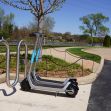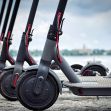Motorized scooters, such as those placed on street corners by Lime, Jump, and Bird, have sparked controversy everywhere they’ve landed. The scooters arrived long before local government agencies had the opportunity to put safety or traffic regulations in place that would provide limits on how, when, and by whom the scooters should be used. In the intervening years, some cities have passed laws regulating scooter use or banning the scooters entirely. Panama City Beach, Florida, is one such city that is seeking to eliminate the scooters entirely from city limits, and a recent Florida Court of Appeals ruling has come down in support of this end.
Any driver in a city where motorized scooters are popular can tell stories of having witnessed an accident or near-accident involving a scooter. In 2017—before the scooters had yet reached certain cities—Consumer Reports found that there were at least 1,545 accidents involving electric scooters. More recent accident rates reported by cities that allow electric scooters are also alarming. During one eight-month period in 2019, Los Angeles reported 223 incidents involving electric scooters, and Miami officials stated that the city’s emergency personnel had responded to more than 105 electric scooter-related incidents in a similar span. Hospitals have seen a massive rise in scooter-related injuries, which can range from scrapes and bruises to broken bones and traumatic brain injuries.
Panama City Beach, Florida, hosts countless revelers over spring break, as well as a steady stream of tourists throughout the year. With its relatively small size, the city immediately felt the impact of dozens of motorized scooters flooding its roads when they first arrived. In 2015, Panama City Beach made its first attempt to regulate the scooters by passing a law that would require scooter riders to wear fluorescent vests and require businesses renting scooters to carry insurance in the event of a crash involving one of the scooters. This law did not survive a challenge by local motorized scooter rental business Classy Cycles, Inc.
Panama City Beach revised its approach in 2017 by enacting two local laws; one that banned overnight rentals of motorized scooters, and another that would ban the scooters from the city altogether beginning in September 2020. Classy Cycles again took the city to court to challenge the law. The beach rentals company argued that the city’s scooter ban was arbitrary and unreasonable since scooter use was not a per se nuisance, and that the city was preempted by state laws from enacting such a law. In contrast, the city pointed to the rights granted to municipalities by Florida’s Municipal Home Rule Powers Act, or MHRPA, to enact laws for any municipal purpose not expressly prohibited by law. The city argued that the MHRPA grants cities the right to prohibit businesses or activities so long as the bans are not arbitrary or unreasonable.
Ruling in favor Panama City, the Florida Court of Appeals agreed that there was no longer a requirement that a business pose a per se nuisance in order for a city to act to prohibit that business. After pointing out the numerous occasions where courts had upheld municipal laws prohibiting activities that were not per se nuisances, the opinion stated, “under modern home rule power, municipalities have broad authority to regulate activities impacting public health, safety, and welfare so long as such regulations are not arbitrary or unreasonable.” The court’s opinion concluded that there was “no error” in a ruling that upheld the law “when the undisputed facts demonstrate that the restriction is for the safety of the city’s citizens and visitors.
The opinion also dispatched with the argument that the laws were preempted by state laws regulating traffic control. The opinion quoted from Florida Statute §316.008, which allows local authorities to “ the use of heavily traveled streets by any class or kind of traffic found to be incompatible with the normal and safe movement of traffic.” “It has always been within the purview of a local government to regulate uses that will cause traffic congestion through its land use code,” the opinion stated. As of September 8, 2020, motorized scooters will no longer be welcome in Panama City Beach.






